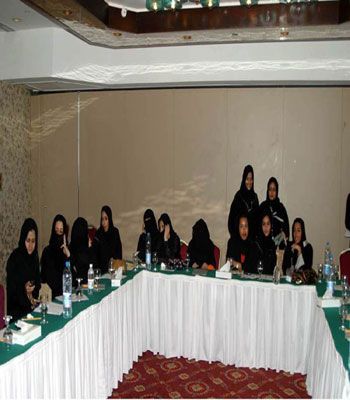
Saudi Arabia: Number of “Unsanctioned” Female Preachers on the Rise
Jeddah, Asharq Al-Awsat – Religious awareness sessions during women’s gathering are becoming more popular across Saudi Arabia. They feature a woman preacher who delivers a lecture or a speech during a meeting of charitable organizations, in private homes and halls, as well as mosques, especially after the evening prayer.
This rise has promoted many Saudis to wonder about the qualifications of these women preachers and whether they are licensed to practice in this field. Many have also sought to find out whether the content and aim of these lectures are monitored, in order to prevent extremist ideologies from gaining ground.
Suhaylah Zein-al-Abidin, an Islamic preacher for more than 25 years, told Asharq al Awsat the procedures to check whether female preachers were qualified were insufficient and needed to be revised.
“Many women preachers rely on religious recording that are distributed at funerals, weddings and in religious shops. Like men, women preachers can also spread extremist views amongst their audience.”
A member of Saudi Arabia ’s national human rights organization, Zein-al-Abidin said it was important to monitor the religious gatherings that take place in private homes, the same way as religious seminars and lectures are supervised by the Ministry of Islamic Affairs. “Women at these gatherings should pay close attention to what they are hearing and not accept everything uncritically.”
Zein-al-Abidin blamed, “the lack of women’s religious knowledge, their inability to distinguish between right and wrong and the silence of educated women” for the spread of extremist ideas and views. Often, she added, “educated women lack the evidence to face up to extremist opinions.”
Another Islamic preacher, Sana Abid, also rejects extremism but defends religious lectures for “being a good source of information. We shouldn’t put an end to this. Of course, the sources of extremist thinking ought to be apprehended and stopped.”
While acknowledging that some women preachers do promote extremist views, Abid said, “It is not right to generalize about all women preachers. We shouldn’t exaggerate the problem [of extremism] and attribute it solely to religious causes.”
Although there is not official authority which licenses women preachers, Abid said they are selected on the basis of “their knowledge of Shariaa and their ability to teach people through wisdom and direct communication.”
Siham al Qahtani, a critic of religious preachers in Saudi Arabia pointed out that both male and female preachers were to blame for the spread of extremist ideologies.
“Society’s negative view of women, religious ignorance, the high right of unemployment amongst women and the small margin of freedom available to women make them easy prey for extremists. Their circumstances are exploited to promote extremist views.”
In a recent announcement, the Ministry for Islamic Affairs revealed it intended to appoint women preachers to full-time posts. In a previous interview with Asharq al Awsat, Sheikh Saleh al Sheikh, the Minister for Islamic Affairs, Endowment and Daawa, said, “The ministry has studied the possibility of appointing women preachers in official posts.”
